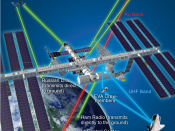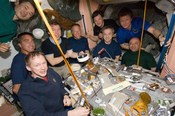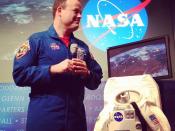Space is the most hostile environment we will ever explore. Even a single five-hour spacewalk requires months of training, and a vast technical backup to keep it safe. The astronauts and cosmonauts who live in space are there for only a few weeks or months; if we want to travel into deep space it could take years. First we'll have to find out just how long the human body can survive in a weightless environment. In zero gravity, four pints of body fluid rush from the legs to the head where it stays for the duration of the mission. Astronauts often feel as if they have a permanent cold, and disorientation can become a major problem. In space there's no physical sensation to let you know when you're upside down and astronauts have to rely on visual clues from their surroundings. A few hours after reaching orbit, one in three of all astronauts will experience space sickness - a feeling rather like carsickness.
And weightless conditions lead to calcium being leached from the bones, and problems with the astronauts' immune systems.
Trillions of rocky fragments - meteoroids - roam our Solar System at speeds of up to 150,000 miles an hour. A asteoroid no bigger than a grain of salt could pierce
a spaceship window. Protection from the extreme hazards of space is going to need some clever technology. Space is also full of lethal radiation - X-rays, gamma rays and the high-speed particles called cosmic rays.
Down here on Earth we are protected by the atmosphere and by our planet's magnetic field, but in space long haul astronauts suffer gradual but irreversible radiation
sickness unless they are carefully shielded. Commander Shepherd is confident the ISS will help us crack the problems "The ISS is going to answer a number...



A little brief
god start, but this feels more like n introduction than n essay. These points you raise re very good but need a bit of expansion
13 out of 13 people found this comment useful.